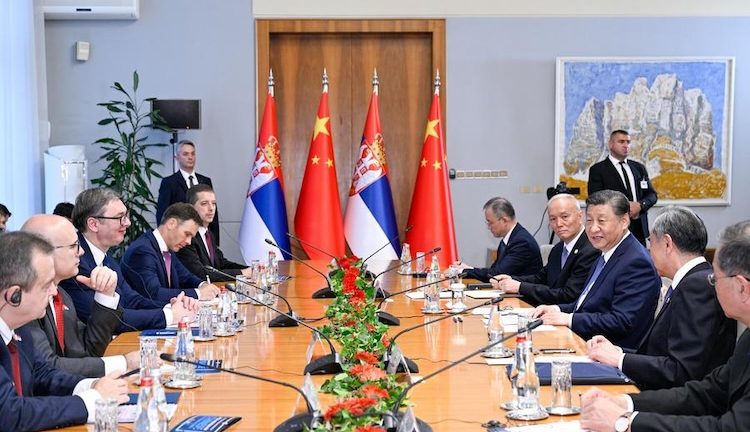By Nickolay Kapitonenko*
KYIV | 14 May 2024 (IDN) — The ongoing Russian-Ukrainian war has gradually changed the international political landscape, which is being closely monitored even by states far removed from its realities. The war is unleashing complex mechanisms of international interaction, testing the strength of alliances and changing power relations. In addition to the still vague future of the international order, significant and concrete issues of current foreign policy are at stake. At least for those states that can actually afford them.
Beijing, having watched the developments for quite some time, has finally decided that it is time to act — willing and ready to play a more prominent role in world politics, based on its greatly increased economic power: China is now the world’s largest economy in purchasing power parity terms, although it still falls short of the historical highs of the Qianlong era, when it accounted for about 30 per cent of the world economy.

China’s economic success has been largely fuelled by the global free trade system, which it joined in 2001. This system makes its huge export-oriented economy dependent on a steady supply of energy and access to major markets — in Southeast Asia, Europe and North America. This, in turn, weaves Beijing into a complex knot of relations with the US, the EU, Russia and a number of regional states around the world, where mutual dependence is accompanied by intense competition and, at times, trade wars.
If we superimpose the apparent crisis in the world order and the Russia-Ukraine war on top of this picture, the scale of the challenges facing Xi Jinping becomes clear. Key among them: confrontation with the US, a complex dialogue with Europe and the relationship with Russia. The changing geometry of the multi-polar world paradigm is pushing China to act. As confrontation with the US looks inevitable and relations with Moscow seem fairly secure, Europe is becoming the decisive focus.
A Chinese alternative
In April, German Chancellor Olaf Scholz visited China to talk about trade, competition and EU dissatisfaction with Chinese state subsidies to its companies. While, Xi chose France, Serbia and Hungary for his European tour in May. Trade, subsidies and competition remained on the agenda, but political issues related to the Russia-Ukraine war and larger geopolitical plans were also topical.
This is particularly true of Xi’s visit to France, where Paris’ special approach to transatlantic relations was accommodated. It was in Paris that the Chinese leader’s words that China and France should work together to create an equal multipolar world were expected to find an attentive audience. In fact, Xi offered France the widest possible cooperation across all spheres, based on the core ideas of his global initiatives: avoiding bloc confrontation and mutual benefit. The German trade dialogue was supplemented in Paris by geopolitical ideas: at stake now is not only 15 per cent of Chinese exports going to the EU, but also an attempt to create an alternative security system in Eurasia based on a partnership between Europe and China. If talk of neo-isolationism in the US becomes louder after the election, the growing popularity of such ideas in Europe cannot be ruled out.
Serbia is an important element of China’s key ‘One Belt, One Road’ initiative
The choice of Serbia and Hungary is also interesting. The reason, of course, is not only that Xi enjoyed the Yugoslav film ‘On the Trail of the Tiger’ (‘The Bridge’) and the song ‘Bella Ciao’ in the Yugoslav version in his youth. The date of the visit coincided with the 25th anniversary of the destruction of the Chinese embassy in Belgrade by an American aerial bomb during a NATO operation, an event that is remembered quite well in Serbia. This provided, once again, an opportunity to look for possible fault lines in the relationship between Europe and the US and to give at least some countries on the continent an alternative. The audience was again appreciative: Xi Jinping and Aleksandar Vučić signed, among almost three dozen documents, a declaration with a meaningful title, on building a Sino-Serbian society with a common destiny, which will expand the strategic partnership between the two states. Investment, financial co-operation and the already familiar Chinese high-tech is on the menu. Serbia is an important element of China’s key ‘One Belt, One Road’ initiative, and China is the most important investor in the country’s economy. A free trade agreement between the two countries will come into force in July, and China’s position in the Balkans will become even stronger.
If the declaration with Serbia speaks of a common destiny, in Budapest, Xi spoke of an all-weather comprehensive strategic partnership in a new era. As an EU Member State, Hungary too plays an important role in the plans of the ‘One Belt, One Road initiative’, and it too has been offered co-operation in infrastructure development, green energy and artificial intelligence. Budapest also spoke of a multipolar world, inclusive globalisation and justice.
Both Serbia and Hungary have long been on China’s radar. The experiences of both countries have been scrutinised since they began to implement their own, national models of socialism, Titoism and kádárism. Then China followed the two countries’ post-socialist transformations, learning lessons and considering their role in the region. Today, they play an important role in what looks like Beijing’s plan to individually convince European countries of the usefulness of partnering with China across the board.
Reassessing the importance of Sino-Russo relations
Xi Jinping’s tour had much more far-reaching goals than addressing problems with Chinese imports of electric cars into Europe, or even what Europeans see as unfair competition. Rather, it appears to be an attempt to take the lead at a moment of apparent crisis in the international order. But such an attempt is inevitably bogged down by the Russian-Ukrainian war and China’s position.
The concern of the Europeans about this position is understandable. But the unacceptability for China of Russia’s defeat is also a matter of principle. And this complicates the search for mutually beneficial solutions to economic and trade problems. The European expectation that China will put pressure on Russia in whatever form looks unconvincing. Beijing has been able to adapt to the realities of the war, limit the risks associated with it, make the most of Russia’s weakness and vulnerability, as well as signalling its readiness to play the role of mediator and actively participate in a post-war settlement when conditions are ripe. At the same time, Europe plays a key role in China’s grand strategy: if its ties with the US can be weakened and if the ties between the two opposite poles of Eurasia, partially destroyed by Russia’s aggression against Ukraine, can be restored, China’s position in the multipolar geometry of the world will become much stronger. But is rapprochement with the EU worth the turnaround in Beijing’s relations with Russia?
Too many obstacles to a strategic China-Europe partnership between
This question remains open. Russia is too important both as a supplier of energy resources and as China’s partner in reshaping the world order. Europe is also important, but so far only as an economic partner. For a truly strategic partnership between China and Europe (and not just individual countries), there are still too many obstacles. Putin’s upcoming visit to China, as well as the Peace Summit in Switzerland, will show how unchanged Beijing’s position remains.
The Russian-Ukrainian war is progressively generating global repercussions. Its dynamics and character are seen by many in the world as a manifestation of Western weakness. The flow of power on a global scale continues, and the limits of the strongest powers are becoming apparent. Many governments, agreeing with Beijing’s assessment of the end of a monopolistic world, are thinking of a balancing strategy.
It could be an opportunity to minimise risks and expand space to manoeuvre. Not only China’s neighbours in the region, but also its distant partners, such as Serbia or Hungary, can resort to such a policy, which is otherwise known as ‘hedging’. If the fashion for hedging intensifies, Beijing could soon revisit its offers for Europe. And then it will be harder to refuse them.
*Nickolay Kapitonenko is an associate professor at the Institute of International Relations at Taras Shevchenko National University of Kyiv and director of the Centre for International Relations Studies. [IDN-InDepthNews]
Original link: https://www.ips-journal.eu/topics/foreign-and-security-policy/the-great-diplomatic-game-7500/
Photo: Chinese President Xi Jinping and Serbian President Aleksandar Vucic hold talks in Belgrade, Serbia, 8 May 2024. Credit: Xinhua/Li Xueren.


